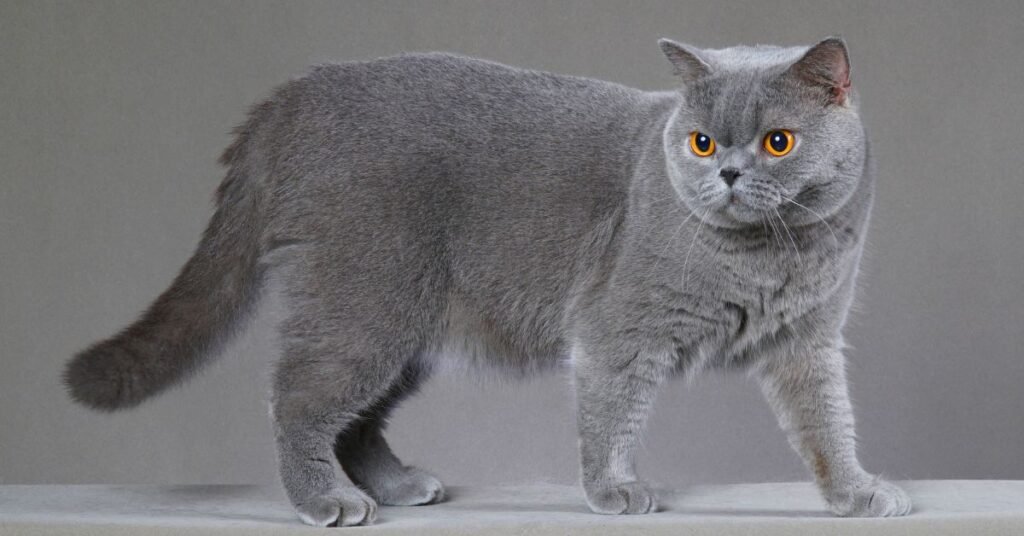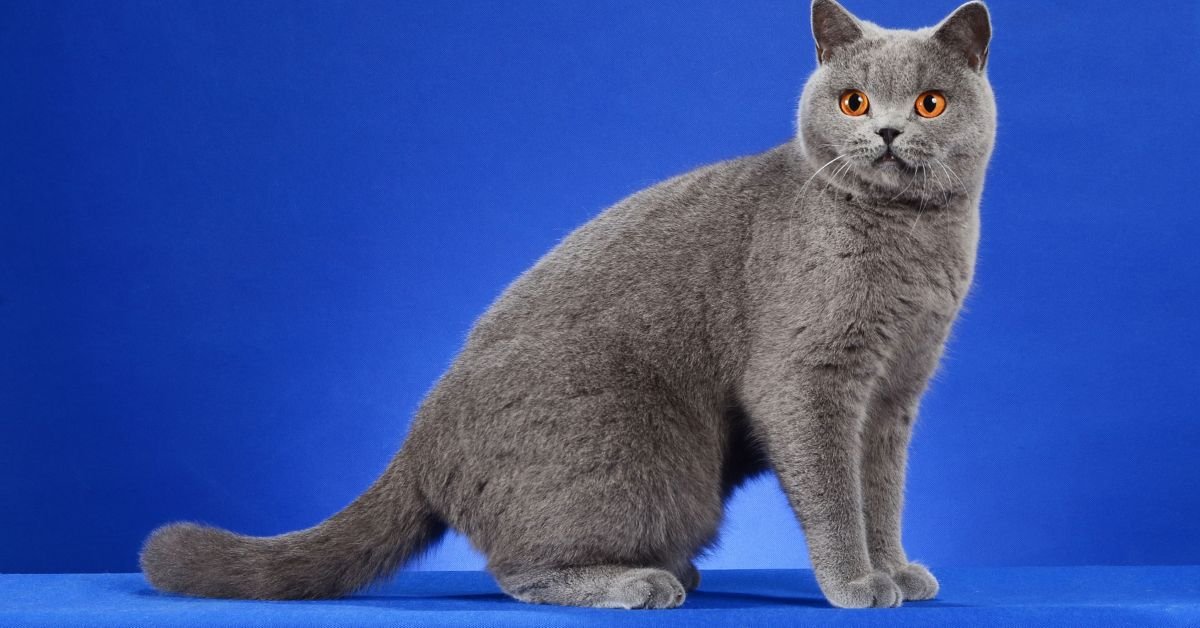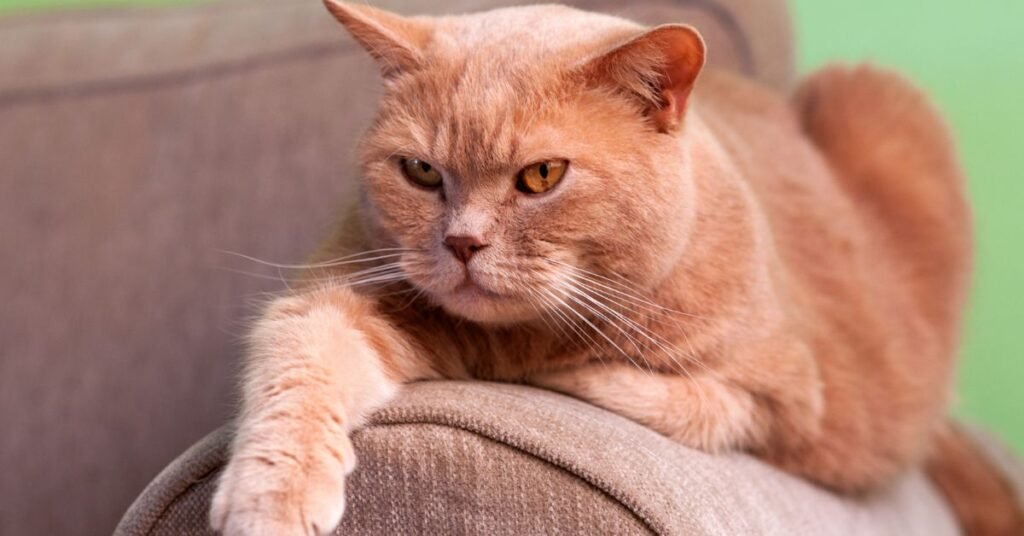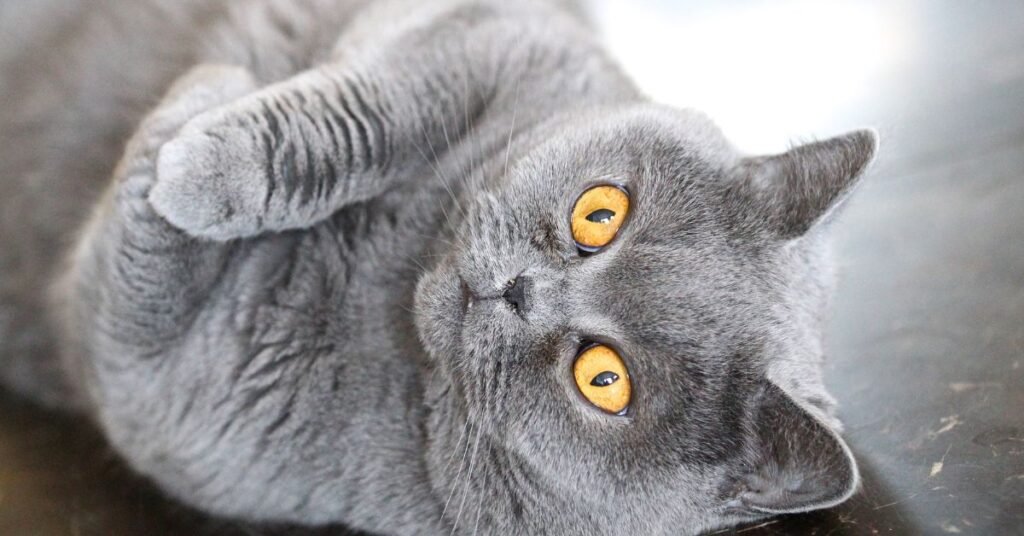//Prices//
British Shorthair Cat Price In India
The price of a British Shorthair cat can vary depending on factors such as the breeder’s reputation, lineage, coat color, and quality of the kitten. On average, British Shorthair Price in India from a reputable breeder in India can range from Rs 20,000 to Rs 60,000 or more.

An Introduction To British Shorthair Cat
History of British Shorthair
The history of the British Shorthair dates back to ancient times. It is believed that these cats were brought to Britain by the Romans around the first century AD. The Romans used these cats to control the rodent population on their ships and in their settlements. Over time, these cats adapted to the British climate and developed their unique characteristics.
During the late 19th century, cat shows gained popularity in Britain, and breeders began to selectively breed the British Shorthair for specific traits. They aimed to preserve the breed’s strong build, dense coat, and distinctive round face. However, during the two World Wars, the breed faced significant challenges as breeding programs were disrupted.
After the Second World War, British Shorthairs were crossbred with other breeds, including Persians, to help rebuild the population. However, dedicated breeders worked tirelessly to maintain the breed’s original traits, and by the 1960s, the British Shorthair regained its recognition and popularity.
Appearance of British Shorthair
The British Shorthair is renowned for its distinct and captivating appearance. This breed boasts a sturdy and muscular build, with a broad chest and strong legs. British Shorthairs have a round faces with full cheeks and a short, broad nose. One of their most striking features is their large, round eyes, which are typically copper or gold in color.
The coat of the British Shorthair is dense, plush, and luxurious to the touch. It stands away from the body, giving the cat a full and substantial appearance. The breed comes in a wide variety of colors and patterns, including solid colors, tabbies, tortoiseshells, and color points. The most iconic color is the “British Blue,” a solid blue-gray coat that is often associated with the breed.
One notable feature of the British Shorthair is their adorable round ears, which are set wide apart and have rounded tips. These cats also have a thick, powerful tail that tapers to a rounded tip. Overall, the British Shorthair’s appearance exudes elegance, strength, and charm, making them instantly recognizable and adored by cat lovers around the world.

British Shorthair Temperament and Activities
The British Shorthair is known for its calm and composed temperament. These cats have a laid-back and easygoing nature that makes them excellent companions. They tend to be independent and enjoy their alone time, but they also form strong bonds with their human companions.
Unlike some more demanding and attention-seeking breeds, British Shorthairs are content with their own company and do not require constant attention. They are generally undemanding and do not have high activity levels. However, they still appreciate interactive playtime and enjoy having toys and scratching posts to keep them mentally stimulated.
While British Shorthairs are not known for being excessively active, they do have bursts of energy and enjoy playing and exploring their surroundings. They are agile and can jump and climb with ease. Providing them with opportunities for exercise and play, such as interactive toys or puzzle feeders, can help keep them physically and mentally engaged.
British Shorthair Cat Health Issues
The British Shorthair is generally a healthy breed with a robust constitution. However, like all cat breeds, they can be prone to certain health issues. Responsible breeders aim to minimize these risks through careful breeding practices and regular health screenings. Here are some health issues that may be seen in British Shorthairs:
Hypertrophic Cardiomyopathy (HCM):
This is a common heart condition in cats, including British Shorthairs. HCM causes thickening of the heart muscles, which can lead to heart failure. Regular cardiac screenings and genetic testing are crucial in detecting and managing this condition.
Polycystic Kidney Disease (PKD):
PKD is an inherited condition characterized by the development of fluid-filled cysts in the kidneys. It can lead to kidney dysfunction over time. Responsible breeders will screen their breeding cats for PKD to reduce the risk of passing it on to offspring.

Obesity:
British Shorthairs have a tendency to gain weight if their diet and exercise are not properly managed. Obesity can lead to various health problems, including joint issues and diabetes. It is important to provide a balanced diet and engage them in regular exercise to maintain a healthy weight.
Dental Issues:
Due to their characteristic facial structure, British Shorthairs may be prone to dental problems such as gingivitis and periodontal disease. Regular dental care, including brushing their teeth and providing appropriate chew toys, can help maintain their oral health.
Polycystic Ovarian Syndrome (PCOS):
Female British Shorthairs may be susceptible to PCOS, which can cause hormonal imbalances and reproductive issues. Regular veterinary check-ups and monitoring are essential for early detection and management.
Care tips for British Shorthair Cat
Grooming:
The dense coat of a British Shorthair requires minimal grooming. Regular brushing with a soft bristle brush or a grooming glove can help remove loose hair and keep their coat in good condition. Pay attention to their ears and teeth as well, and clean them periodically to prevent wax buildup or dental issues.
Diet and Nutrition:
Provide your British Shorthair with balanced, high-quality cat food that meets their nutritional needs. Avoid overfeeding, as British Shorthairs can be prone to obesity. Consult with your veterinarian to determine the appropriate portion size and feeding schedule for your cat.
Exercise and Play:
While British Shorthairs are not as high-energy as some other breeds, they still benefit from regular exercise and playtime. Provide them with interactive toys, scratching posts, and opportunities to climb and explore their environment. Engage in interactive play sessions to keep them mentally stimulated and physically active.
Regular Veterinary Check-ups:
Schedule regular veterinary check-ups to monitor your British Shorthair’s health, update vaccinations, and address any concerns. Early detection and treatment of any health issues can lead to better outcomes.
Mental Stimulation:
British Shorthairs are intelligent cats, and providing mental stimulation is important for their well-being. Consider puzzle toys or treat-dispensing toys to engage their minds and prevent boredom.
Litter Box Maintenance:
Keep their litter box clean and provide a litter substrate that they prefer. British Shorthairs appreciate a clean and private space for their bathroom needs, so maintaining cleanliness is important.

British Shorthair Cat Lifespan
The average lifespan of a British Shorthair is typically around 12 to 16 years. With proper care, a healthy diet, regular exercise, and routine veterinary check-ups, some British Shorthairs have been known to live even longer, reaching their late teens or early twenties.
British Shorthair Cat Maintenance Cost
Veterinary Care:
Regular veterinary check-ups, vaccinations, and preventive treatments are necessary to maintain your cat’s health. Annual vaccinations and health check-ups can cost around INR 2,000 to INR 5,000 ($28 to $70) or more.
Food:
Providing high-quality cat food that meets the nutritional needs of your British Shorthair is important. The monthly cost of food can range from INR 1,500 to INR 3,000 ($21 to $42) depending on the brand and dietary requirements.
Grooming:
British Shorthairs have relatively low grooming needs. The cost of grooming tools, such as brushes and nail clippers, may range from INR 500 to INR 1,000 ($7 to $14). If you prefer professional grooming services, occasional visits to a groomer may cost around INR 500 to INR 1,500 ($7 to $21) per session.
Other Expenses:
Additional expenses may include litter, litter box, toys, scratching posts, and bedding. These costs can vary, but on average, they may range from INR 1,000 to INR 2,000 ($14 to $28) per month.
Facts About British Shorthair Cat
1. The British Shorthair is one of the oldest cat breeds, originating from Britain.
2. They are known for their round faces, round eyes, and plush coats.
3. British Shorthairs have a calm and laid-back temperament.
4. They are generally good with children and other pets.
5. The breed comes in various coat colors and patterns, with “British Blue” being the most popular.
6. British Shorthairs are not hypoallergenic but may produce fewer allergens.
7. They have a sturdy and muscular build, with males weighing around 12-17 pounds (5.4-7.7 kg) and females weighing 8-12 pounds (3.6-5.4 kg).
8. British Shorthairs have a lifespan of around 12-16 years, with some living into their late teens.
9. They have minimal grooming needs but should be regularly brushed to maintain their coat.
10. British Shorthairs are known for their independent yet affectionate nature.
Frequently Asked Questions
Are British Shorthairs good pets?
Yes, British Shorthairs make wonderful pets. They have a calm and easygoing nature, are generally good with children and other pets, and form strong bonds with their human companions. They are independent yet affectionate, making them great companions for individuals or families.
Do British Shorthairs shed a lot?
British Shorthairs have a dense and plush coat that sheds moderately. Regular brushing can help minimize shedding and keep their coat in good condition. However, compared to some other breeds, British Shorthairs are considered to be moderate shedders.
Are British Shorthairs hypoallergenic?
No, British Shorthairs are not hypoallergenic. While they may produce fewer allergens compared to some other breeds, they still produce the Fel d 1 protein, which is the primary allergen in cats. Individuals with cat allergies may still experience allergic reactions to British Shorthairs.
How big do British Shorthairs get?
British Shorthairs are known for their sturdy and muscular build. On average, male British Shorthairs can weigh between 12 to 17 pounds (5.4 to 7.7 kilograms), while females typically weigh between 8 to 12 pounds (3.6 to 5.4 kilograms). However, individual sizes may vary.
Do British Shorthairs require a lot of exercise?
British Shorthairs are not highly active cats compared to some other breeds. While they enjoy occasional playtime and exercise, they do not have demanding exercise needs. Providing them with interactive toys and opportunities to climb and explore can help keep them mentally and physically stimulated.
Can British Shorthairs be left alone?
British Shorthairs are generally independent cats and can tolerate being left alone for reasonable periods. However, they still require social interaction and companionship. It is recommended to provide them with environmental enrichment, such as toys and scratching posts, to keep them mentally stimulated when alone.

